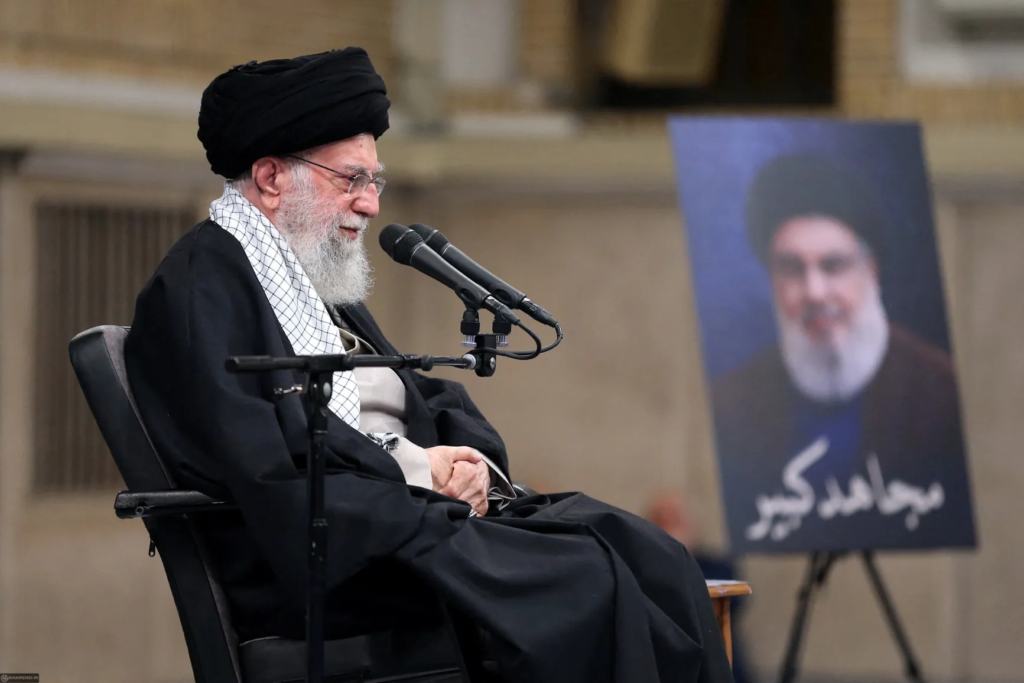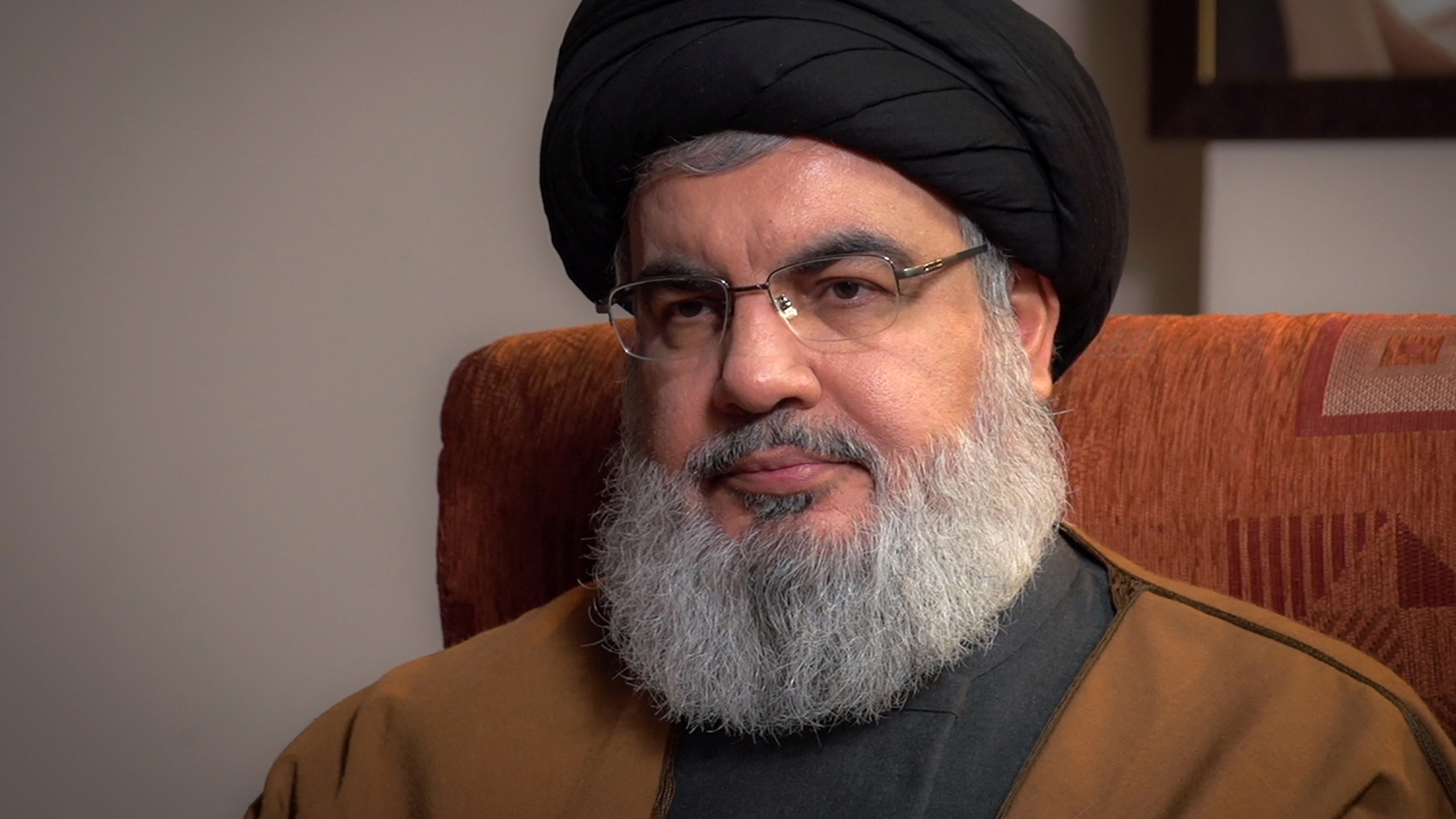Audio message of Nasrallah echoed across Hezbollah’s network, two weeks after the group’s leader was reportedly killed in an Israeli airstrike. This recording marked a significant moment for the Lebanese militant group, signaling resilience in the face of loss.
As violence continues to escalate in the region, the audio message has triggered reactions from Hezbollah supporters, the Israeli military, and international stakeholders.
Nasrallah’s Posthumous Message to Hezbollah Fighters
In the emotionally charged recording, Hassan Nasrallah delivered a message to Hezbollah’s fighters, emphasizing the importance of defending their land, people, and dignity.
Nasrallah’s voice, familiar to many in Lebanon and the Middle East, could be heard rallying his followers: “We count on you to protect your people, your families, your nation, your values, and your dignity.
Read : Israeli Strike Silenced a Beating Heart of Lebanon as it Ruins Nabatiyeh Market
Defend this sacred and blessed land, and its honorable people.” His words resonated deeply as Hezbollah finds itself engaged in near-daily exchanges of fire with Israeli forces.
The timing of the release—just over two weeks after reports of Nasrallah’s death—raises questions about its significance. According to Lebanese sources, Nasrallah’s death occurred during an Israeli airstrike on September 27 in southern Beirut, a claim that has fueled tensions between Israel and Hezbollah.
The group has remained steadfast, leveraging the recording as a means of boosting morale among its members and supporters, especially as the region braces for further conflict.
This audio recording, reportedly made during a military maneuver, serves as a symbolic reaffirmation of Hezbollah’s resilience. For Hezbollah, the loss of Nasrallah represents more than just the death of a leader; it is the end of an era of charismatic leadership that has shaped the group’s identity.
Yet, this broadcast demonstrates that even in death, Nasrallah’s message remains influential, providing ideological fuel for the organization’s fighters as they confront escalating violence.
Hezbollah releases bombshell audio message of #HassanNasrallah after biggest attack on IDF in #Haifa
— The Times Of India (@timesofindia) October 14, 2024
Watch for more details pic.twitter.com/FtEEw6WLoa
The recording also amplifies Hezbollah’s determination to continue fighting Israeli forces, especially after several significant events involving heightened aggression between the two sides. Tensions in the region have been particularly volatile since October 7, when a Hamas attack on Israeli civilians led to a surge of military actions.
Since then, Hezbollah has ramped up its engagement, standing in solidarity with Hamas and targeting Israeli military positions near the Lebanese-Israeli border.
Recent Developments in the Hezbollah-Israel Conflict
The conflict between Hezbollah and Israel has intensified over the past weeks, with Hezbollah launching around 115 projectiles into Israeli territory as of Sunday afternoon, according to reports from the Israeli military.
This comes amid broader regional unrest following Hamas’ deadly attack in October 2023, which resulted in the deaths of over 1,200 civilians in Israel. In response, Israel initiated a wide-scale military campaign in Gaza, prompting regional allies like Hezbollah to join the conflict.
Notably, the ongoing conflict has seen Hezbollah engage in near-daily skirmishes with Israeli forces, increasing the stakes in a region already suffering from a high death toll and widespread displacement.
As Israeli forces carry out operations against Hezbollah militants, the group continues to retaliate with rocket fire and other military actions.
One of the more significant incidents involved the capture of a Hezbollah fighter by Israeli forces after he emerged from a tunnel in southern Lebanon. The capture marked the first such event since Israel’s ground offensive began, signaling the growing intensity of the conflict.
These skirmishes and retaliatory acts have only exacerbated the already volatile situation, as both sides accuse each other of violating territorial agreements and international law.

Israel has long considered Hezbollah a grave threat, given its well-trained militia, advanced weapons arsenal, and strong backing from Iran. The two sides have clashed repeatedly over the years, but the recent uptick in hostilities has raised concerns about a broader regional conflict.
Hezbollah’s actions are seen by many as an extension of Iran’s influence in the region, with Tehran providing both military and financial support to the group.
Meanwhile, the Lebanese civilian population is caught in the crossfire. The death toll in Lebanon has surpassed 1,200 since hostilities escalated in late September, and over a million people have been displaced.
The humanitarian crisis is deepening, particularly in southern Lebanon, where families face constant threats from airstrikes, artillery fire, and food shortages.
UN Peacekeepers and the Escalating Tensions
The ongoing conflict between Hezbollah and Israeli forces has also raised concerns within the United Nations, particularly among UNIFIL (United Nations Interim Force in Lebanon) peacekeepers. As violence intensifies, there have been multiple reports of violations involving both Israeli forces and Hezbollah militants.
One such incident occurred early Sunday morning, when two Israeli Merkava tanks breached a UNIFIL post in southern Lebanon, causing alarm within the peacekeeping community.
According to UNIFIL, around 4:30 a.m., the tanks forcibly entered the Ramia area, where peacekeepers were taking shelter. The tanks reportedly left the position 45 minutes later, but the incident was immediately condemned by UN officials as a violation of international peace protocols.
The Israeli military later issued a statement claiming that the tanks had inadvertently entered the area while trying to evacuate injured soldiers under fire. However, the incident has further strained relations between Israel and UNIFIL, with the peacekeeping force demanding an explanation for what they described as “shocking violations.”
UNIFIL, which has been stationed in southern Lebanon since 1978 under UN Security Council Resolution 1701, has played a critical role in maintaining a fragile peace in the region.

The resolution stipulates that only Lebanese army forces and UN peacekeepers should operate in southern Lebanon, effectively barring Hezbollah and Israeli troops from entering the area. However, the recent violations highlight the difficulty of enforcing these protocols amid such a volatile situation.
The Israeli government, led by Prime Minister Benjamin Netanyahu, has called for the removal of UNIFIL troops from southern Lebanon, arguing that their presence has emboldened Hezbollah.
Netanyahu’s stance has sparked widespread debate, with Lebanese Prime Minister Najib Mikati strongly condemning the suggestion. Mikati argued that removing UNIFIL would only exacerbate the violence, framing Netanyahu’s comments as part of a broader strategy to undermine international peace efforts.
French President Emmanuel Macron also weighed in on the issue, criticizing the targeting of UNIFIL troops and calling it “absolutely unacceptable.” Macron emphasized the need for a continued UN presence to prevent further escalation between Hezbollah and Israel, warning that the situation could spiral into a full-scale regional conflict if not addressed through diplomacy.
The Broader Regional Impact and Calls for Ceasefire
As tensions continue to mount between Hezbollah and Israeli forces, the conflict’s broader regional implications are becoming increasingly apparent. The violence is deeply intertwined with the ongoing war in Gaza, where Israeli airstrikes have decimated large parts of the territory in response to the Hamas attack.
Gaza’s health ministry has reported that over 42,000 lives have been lost since the conflict began, while the UN has verified the accuracy of these figures.
In solidarity with Hamas, Hezbollah’s involvement has further escalated the conflict, drawing in regional powers like Iran, which supports both groups. Iran’s top diplomat, Abbas Araqchi, recently stated during a visit to Baghdad that Tehran is “fully prepared for a war situation,” though he stopped short of directly declaring military involvement.
Araqchi’s comments reflect the precarious balance in the region, where any further escalation could trigger broader international involvement.

Lebanon’s Prime Minister Mikati has announced plans to approach the UN Security Council to call for an immediate ceasefire. Mikati’s call for peace has been echoed by other regional leaders, though a resolution remains uncertain amid the intensifying hostilities.
The United States has also taken steps to bolster Israeli defenses, deploying a high-altitude anti-missile system and additional military personnel to Israel in response to potential Iranian threats.
The humanitarian crisis continues to deepen, particularly in areas like Gaza and southern Lebanon, where displaced populations are struggling with limited access to food, clean water, and medical supplies. As the violence drags on, calls for a ceasefire have grown louder, though it remains to be seen whether diplomatic efforts can stem the tide of bloodshed.
Hezbollah’s release of Hassan Nasrallah’s posthumous audio recording takes on even greater significance. As a symbol of defiance and resilience, the message serves as a rallying cry for Hezbollah’s fighters, even as international calls for peace grow louder. Whether this recording will further inflame tensions or serve as a unifying force within Hezbollah remains to be seen.

